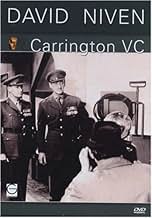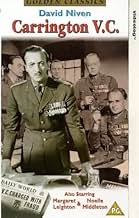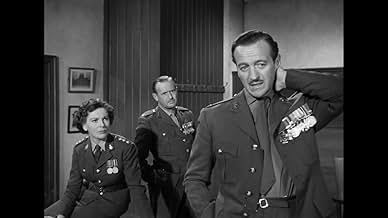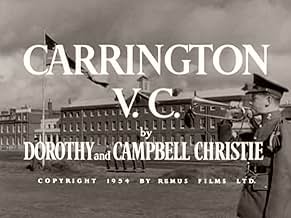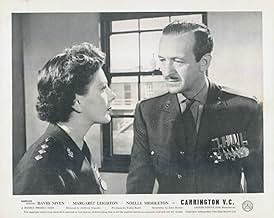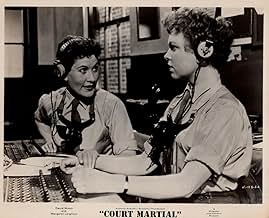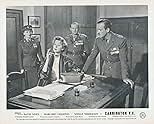A court-martial attempts to find out why, and if, an officer embezzled his unit's funds.A court-martial attempts to find out why, and if, an officer embezzled his unit's funds.A court-martial attempts to find out why, and if, an officer embezzled his unit's funds.
- Director
- Writers
- Stars
- Nominated for 5 BAFTA Awards
- 5 nominations total
- Director
- Writers
- All cast & crew
- Production, box office & more at IMDbPro
6.9860
1
2
3
4
5
6
7
8
9
10
Featured reviews
Court Martial
Carrington, VC finds career army officer David Niven doing something reckless and
a bit stupid besides. He borrows a bit of money from the Officer's Fund of his
unit to pay some household bills. He's owed a lot of back pay allowances that
the fine military machine of the British army hasn't seen fit to cough up. But he
is a winner of the Victoria Cross, the VC of the title and the commander of the
regiment Allan Cuthbertson is a most jealous man. He might be the head of the
regiment, but the men look to Niven.
If you remember the Clint Eastwood film Heartbreak Ridge at one point Gunnery Sergeant Eastwood helps out one of his enlisted men make ends meet the way Niven is having problems with his wife and family. But officers don't have concerned gunnery sergeants.
In any event Niven is being court martialed for the offense, charges brought by Cuthbertson. How it goes I will not say, but Niven is given a royal kick in the keester by a jealous wife Margaret Leighton who suspects some hanky panky going on with a female officer and her husband.
The great critique by me and others is that David Niven more than any other actor had to carry a lot of mediocre films on the strength of being debonair and charming. Not so in Carrington, VC, this is a fine military courtroom drama that stands on its own merits. Niven does well in the lead and grateful for this being a film he didn't have to carry.
Allan Cuthbertson is one of those actors who just does well in everything he's cast in. He's quite the martinet and jealous of Niven's war service and decoration. He spent the war directing a shore battery that was called upon to shoot down Mr. Hitler's Luftwaffe planes, no chance for medals or glory there.
The second member of the supporting cast who is outstanding is Victor Maddern playing Niven's sergeant and biggest fan.
Carrington, VC has a bit of The Caine Mutiny and some of The Winslow Boy in its plot and presentation. But it's a good courtroom drama and all actors love doing them.
If you remember the Clint Eastwood film Heartbreak Ridge at one point Gunnery Sergeant Eastwood helps out one of his enlisted men make ends meet the way Niven is having problems with his wife and family. But officers don't have concerned gunnery sergeants.
In any event Niven is being court martialed for the offense, charges brought by Cuthbertson. How it goes I will not say, but Niven is given a royal kick in the keester by a jealous wife Margaret Leighton who suspects some hanky panky going on with a female officer and her husband.
The great critique by me and others is that David Niven more than any other actor had to carry a lot of mediocre films on the strength of being debonair and charming. Not so in Carrington, VC, this is a fine military courtroom drama that stands on its own merits. Niven does well in the lead and grateful for this being a film he didn't have to carry.
Allan Cuthbertson is one of those actors who just does well in everything he's cast in. He's quite the martinet and jealous of Niven's war service and decoration. He spent the war directing a shore battery that was called upon to shoot down Mr. Hitler's Luftwaffe planes, no chance for medals or glory there.
The second member of the supporting cast who is outstanding is Victor Maddern playing Niven's sergeant and biggest fan.
Carrington, VC has a bit of The Caine Mutiny and some of The Winslow Boy in its plot and presentation. But it's a good courtroom drama and all actors love doing them.
" .. I said an affair wan't good enough for you; not the same thing at all...."
Asquith's courtroom drama is surprisingly gripping. Trapped within the rigid confines of a military structure, a social structure and his own personal integrity, Niven plays a man whose career and reputation (if not his stiff upper lip) are at stake in a court martial.
This film was made sixty years ago and things have changed a lot since then; unless one bears in mind how things were then, this film's plot make less sense. However if you take this into account, it is a pretty good film.
it has been commented by others that there are commonly certain protocols observed whenever a VC holder enters a room; there is no formal requirement that this is done but traditionally VC holders may be saluted by others regardless of rank. This may or may not be the case within a court-martial situation but that this was omitted in the film is understandable since it would have been distracting to the thrust of the plot, with the whole court up and down like jack-in-the-boxes all the time.
Taken on its merits this is a pretty good film, IMHO deserving of a better score than it currently has on here.
This film was made sixty years ago and things have changed a lot since then; unless one bears in mind how things were then, this film's plot make less sense. However if you take this into account, it is a pretty good film.
it has been commented by others that there are commonly certain protocols observed whenever a VC holder enters a room; there is no formal requirement that this is done but traditionally VC holders may be saluted by others regardless of rank. This may or may not be the case within a court-martial situation but that this was omitted in the film is understandable since it would have been distracting to the thrust of the plot, with the whole court up and down like jack-in-the-boxes all the time.
Taken on its merits this is a pretty good film, IMHO deserving of a better score than it currently has on here.
Even better than The Caine Mutiny
Imagine a cross between The Caine Mutiny and 12 Angry Men, and you'll get Court Martial. This military courtroom drama is tense, thrilling, and will keep you at the edge of your seat from beginning to end.
David Niven is a highly respected and decorated major, and he's been court martialed for three offenses: stealing money, entertaining a woman in his quarters, and leaving the base without permission. The entire film takes place in the courthouse, and it is intense! The men on the jury all know David Niven personally, and they try to put their bias aside for the sake of the law. Noelle Middleton, a captain, tries to defend him-but is she also biased, since she was the woman in his quarters? And finally, Niven's wife: Margaret Leighton. Niven insists she's too ill to testify, but when she shows up in court, will she condemn or defend him?
The acting in this film is fantastic, not only by Niven and his two leading ladies, but also by the supporting men on the jury. It's very hard to act in a real-time film, because you constantly have to have an emotional buildup in your character's performance-there's no "three weeks later" downtime in the plot, or a cutaway to another character's side-story. Anthony Asquith must have given his actors great direction, because they were all very convincing. John Hunter's script, based on Campbell and Dorothy Christi's play, is intelligent, thoughtful, and fast-paced; you're going to need to pay close attention on this one, but it's worth it! Unfortunately for this movie, it came out the same year as the more successful The Caine Mutiny, so the Academy forgot about the British drama at the Oscars. Although Humphrey Bogart was very good, David Niven absolutely deserved a nomination for his incredible performance.
David Niven is a highly respected and decorated major, and he's been court martialed for three offenses: stealing money, entertaining a woman in his quarters, and leaving the base without permission. The entire film takes place in the courthouse, and it is intense! The men on the jury all know David Niven personally, and they try to put their bias aside for the sake of the law. Noelle Middleton, a captain, tries to defend him-but is she also biased, since she was the woman in his quarters? And finally, Niven's wife: Margaret Leighton. Niven insists she's too ill to testify, but when she shows up in court, will she condemn or defend him?
The acting in this film is fantastic, not only by Niven and his two leading ladies, but also by the supporting men on the jury. It's very hard to act in a real-time film, because you constantly have to have an emotional buildup in your character's performance-there's no "three weeks later" downtime in the plot, or a cutaway to another character's side-story. Anthony Asquith must have given his actors great direction, because they were all very convincing. John Hunter's script, based on Campbell and Dorothy Christi's play, is intelligent, thoughtful, and fast-paced; you're going to need to pay close attention on this one, but it's worth it! Unfortunately for this movie, it came out the same year as the more successful The Caine Mutiny, so the Academy forgot about the British drama at the Oscars. Although Humphrey Bogart was very good, David Niven absolutely deserved a nomination for his incredible performance.
Carrington V.C.
This is quite a decent military court-room drama in which David Niven finds himself accused of pinching a large sum from his battalion funds. At the ensuing court martial, he must answer the charges relying on his honesty and integrity - he has a V. C. after all - and on receiving, somewhat naively, a reciprocal degree of honesty and integrity from others. It's quite a neat little story about revenge and snobbery; tempered with the odd bit of human decency and Niven is ideal for the part. Margaret Leighton is also quite good as his rather aloof wife and Allan Cuthbertson as his supercilious commanding officer "Col. Henniker" who clearly both have axes to grind. The ending isn't great, but otherwise it is a simple story well told.
The Copper Key
Nearly a decade after 'A Matter of Life and Death' David Niven once more finds himself on trial - this time conducting his own defence - in this very respectable addition to the rollcall of theatrical adaptations directed by Anthony Asquith, although Niven himself neglects to mention in his memoirs.
In 'The Winslow Boy' the accused was charged with purloining a postal order, this time the bone of contention is £125 missing from a safe. Aside from the quality of the acting Asquith makes good use of acoustics by making the soundtrack totally devoid of music and the comic effect when Geoffrey Keen tells the court orderly to stop stamping in observance of an enormous sign reading 'Silence Court-Martial in Progress'.
In 'The Winslow Boy' the accused was charged with purloining a postal order, this time the bone of contention is £125 missing from a safe. Aside from the quality of the acting Asquith makes good use of acoustics by making the soundtrack totally devoid of music and the comic effect when Geoffrey Keen tells the court orderly to stop stamping in observance of an enormous sign reading 'Silence Court-Martial in Progress'.
Did you know
- TriviaThe VC worn by David Niven was a genuine medal borrowed by the studio. It belonged to Arthur Henry Cross VC, Machine Gun Corps (Camberwell).
- GoofsA British court-martial appeal does not allow new evidence, as it is not a retrial of a case, but a trial of the trial itself, to argue improper procedure or other problems with the trial.
- Quotes
Major Broke-Smith: What's he like?
Lt. Col. Reeve: Henniker? Proper bastard if you ask me.
- ConnectionsRemade as ITV Play of the Week: Carrington V.C. (1960)
- How long is Court Martial?Powered by Alexa
Details
- Runtime
- 1h 45m(105 min)
- Color
- Aspect ratio
- 1.37 : 1
Contribute to this page
Suggest an edit or add missing content

